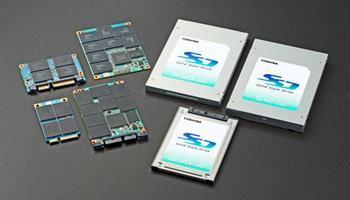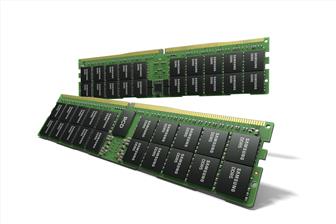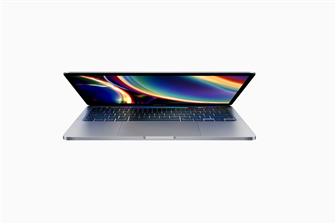
Toshiba has announced an expanded line-up of NAND flash-based solid state drives (SSDs) based on the company's 32nm MLC NAND flash memory.
Toshiba's new drives are the 128GB half-slim/mSATA SG series SSD modules for mobile applications including mini mobile PCs and netbooks, and the HG series for notebooks, gaming and home entertainment systems.
Both new series support the TRIM command implemented in Windows 7. TRIM enables the OS to tell the SSD controller that the data can be actually deleted, freeing the blocks for subsequent use and maintaining SSD performance across its life, the company said.
Samples of the new Toshiba SSDs will be available in the first quarter of 2010, with mass production scheduled for the second quarter.

Samsung HKMG DDR5
Samsung Electronics has expanded its DDR5 DRAM memory portfolio with a 512GB DDR5 module...
Photo: Company

Nvidia GeForce RTX 30 series GPUs
Nvidia's GeForce RTX 30 series GPUs are powered by the company's Ampere architecture. The...
Photo: Company

Apple HomePod mini
Apple's HomePod mini is the newest addition to the HomePod family. At just 3.3 inches tall,...
Photo: Company

Apple 13-inch MacBook Pro with Magic Keyboard
Apple has updated the 13-inch MacBook Pro with the new Magic Keyboard for an improved typing...
Photo: Company

Apple iPad Pros
Apple's new iPad Pros comes with the latest A12Z Bionic chip, an ultra-wide camera, studio-quality...
Photo: Company
- Musk says chip capacity will decide winner of AI race (Mar 21) - EE Times
- Google taps MediaTek for cheaper AI chips (Mar 17) - The Information
- European project gets $260 million for HPC chip sovereignty (Mar 6) - EE Times
- The trouble with MAGA's chipmaking dreams (Mar 3) - Economist
- Automotive chips: Gloom and doom or boom by 2030? (Feb 14) - EE Times
- Deepseek is more Wall Street than Silicon Valley (Feb 3) - Culpium, by Tim Culpan
- Tech CEOs try to reassure Wall Street after DeepSeek shock (Jan 30) - Wall Street Journal
- TSMC to make chips for cryptominer Bitdeer at new US fab (Jan 17) - Culpium, by Tim Culpan
![]() Interview with Boston Dynamics founder: Robotics growth fueled by AI but humanoid debate continues
Interview with Boston Dynamics founder: Robotics growth fueled by AI but humanoid debate continuesThe demand for humanoid robots is on the rise, driven in part by the optimism of industry leaders such...
![]() MWC 2025
MWC 2025The 2025 Mobile World Congress (MWC 2025) was held in Barcelona, Spain, from March 3 to March 6. A gathering for industry leaders and members of the...

AI server BBU and Taiwan players, 2025
Taiwan-based power supply giants will benefit from rising demand for AI servers as the application's adoption of BBUs is set...

Tesla AI development in EVs and robots
Tesla leads the trend of automakers deploying humanoid robots, with reducing labor workforce as the initial goal.

India 5G market and development, 2025
India is rising to become a major 5G nation and a growth driver for the global telecom market in 2025.






